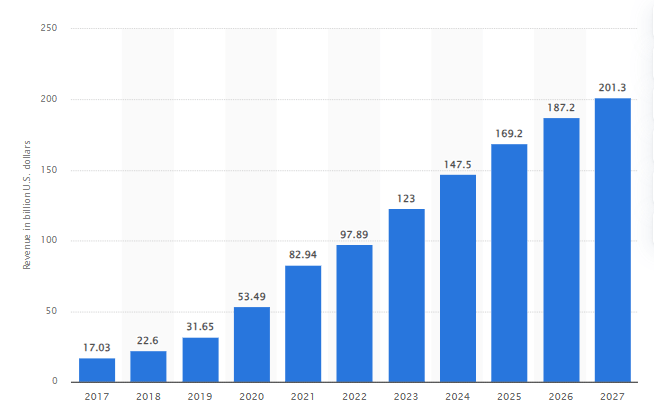
The world of online shopping is constantly changing, and 2024 sees two exciting trends taking center stage: Quick Commerce (Q-commerce) and Recommerce. These aren't just passing fads, they represent a fundamental shift in how we shop online. Q-commerce is all about speed, promising lightning-fast delivery of your purchases. Recommerce, on the other hand, focuses on value, promoting a more eco-friendly and mindful way to shop.
Let us learn more about these trends, by exploring what's driving them and how they'll shape the future of eCommerce.
Quick Commerce: Speeding Up Online Shopping
Quick commerce, or Q-commerce, is the latest trend in online shopping, offering super-fast deliveries. Unlike traditional online stores that take days to deliver, Q-commerce aims to get your order to you in under an hour, sometimes even minutes! Advanced technology like eCommerce AI, smart logistics systems, clever route planning, and real-time stock checks allow businesses to operate at lightning speed. Additionally, many people today expect things right away, similar to how they can instantly access information online. Now, they want the same for products too. The rise of Q-commerce shows how both consumer habits and technology are changing. This trend is likely to continue, making online shopping even faster and more responsive in 2024 and beyond.

Revenue of the quick commerce market worldwide from 2017 to 2027 (in billion U.S. dollars)
Source: Statista
Recommerce in 2024: The Rise of Used Goods
Buying and selling pre-owned items is no longer a niche trend; it's become mainstream. This "Recommerce revolution" is driven by several factors, including a growing focus on sustainability and affordability. Consumers are increasingly becoming aware of the environmental impact of fast fashion and overconsumption. Recommerce offers an eco-friendlier alternative, extending the life of products and reducing the need for new production. This shift towards a "circular economy" benefits the environment by minimizing waste and lowering the carbon footprint associated with manufacturing.
Read Also:How AI is Driving Sustainability in eCommerce?
Challenges in Quick Commerce and Recommerce
The rapid rise of Quick Commerce and Recommerce presents several hurdles that businesses must address to ensure sustainable growth and consumer satisfaction.
-
Speedy Deliveries, Complex Solutions: In Q-commerce, fulfilling the promise of ultra-fast deliveries requires a network of efficient warehouses, smart eCommerce capabilities like inventory management, and seamless last-mile delivery. Cities add another layer of difficulty with traffic and regulations. Recommerce faces different logistical challenges, like collecting, inspecting, and redistributing used items. Building trust relies on verifying their quality and authenticity, requiring investment in robust and future-proof eCommerce technology.
-
Building Trust and Maintaining Quality: Both rely heavily on consumer trust. In Q-commerce, customers expect products to arrive quickly and in perfect condition. Recommerce success hinges on customers believing in the quality and condition of pre-owned items. Businesses can address this by establishing rigorous quality control and providing transparent and personalized eCommerce marketing.
-
Scaling for Success: Scaling operations while maintaining efficiency is a significant challenge for both the commerce types. Q-commerce requires continuous investment in technology and infrastructure to meet growing demands without compromising speed. Recommerce businesses on the other hand, need to find ways to source enough high-quality used items and manage an ever-expanding and complex inventory.
-
Keeping Pace with Evolving Needs: Consumer expectations are constantly evolving. Businesses need to be agile and innovative to stay ahead of the curve. They should leverage advanced eCommerce analytics and data to understand and anticipate customer needs, constantly improving their service offerings.
Future Trends in Quick Commerce and Recommerce
As we look beyond 2024, the landscapes of Quick Commerce and Recommerce are poised for further evolution, shaped by technological innovation, shifting consumer behaviors, and a deepening commitment to sustainability. These future trends not only highlight the potential trajectories of these commerce types, but also emphasize on the opportunities for businesses to innovate and adapt.
-
Technological Advancements: In Q-commerce, the integration of eCommerce AI and machine learning capabilities will continue to enhance logistic efficiencies, from predictive analytics for inventory management to dynamic routing for faster deliveries. Recommerce is set to benefit from advancements in technology as well, particularly through Blockchain for authentication and ownership tracking of high-value items. This could significantly bolster consumer trust in buying pre-owned goods, opening new segments of luxury and rare items for Recommerce platforms.
-
Personalization and Customer Experience: Both Q-commerce and Recommerce will see a shift towards hyper-personalized shopping experiences. Using advanced analytics and AI, businesses will offer personalized product recommendations, tailored shopping journeys, and dynamic pricing models.
Read Also:How AI is Revolutionizing eCommerce with Hyper-Personalization?
-
Sustainability and Circular Economy: Sustainability will become an even more critical driver of consumer preference in the future. In Recommerce, this will translate into an increased emphasis on the circular economy, where the focus on recycling, refurbishing, and reselling goods significantly reduces environmental impact.
-
Expanded Reach and Accessibility: Both sectors will likely see expanded reach and accessibility, breaking down geographical and socio-economic barriers. Q-commerce would extend to rural and underserved areas, while Recommerce platforms might find innovative ways to include low-income consumers, either as buyers or sellers, fostering inclusivity and broadening the market.
Diginyze's Role in Shaping the Future of eCommerce
Diginyze, an AI-powered eCommerce platform is poised to influence the future trajectory of eCommerce. With unparalleled AI and eCommerce automation capabilities and a deep understanding of market dynamics, Diginyze is uniquely equipped to help both Q-commerce and Recommerce businesses harness the full potential of advanced eCommerce technology.
As the eCommerce landscape continues to evolve, Diginyze remains at the forefront, embracing future trends and preparing businesses to capitalize on them. Diginyze's role in the eCommerce ecosystem is that of a visionary leader, guiding businesses through the complexities of modern eCommerce and paving the way for a more efficient, sustainable, and consumer-centric future.
Takeaway
The rapid rise of Q-commerce and Recommerce in 2024 signifies a fundamental shift in consumer expectations, prioritizing immediacy, sustainability, and personalization. These trends pave the way for a more efficient, connected, and eco-friendly future of commerce. Diginyze, through its commitment to AI and empowering businesses, is positioned to lead this transformation. By addressing the challenges and opportunities of these emerging sectors, Diginyze actively shapes the future of eCommerce, prioritizing efficiency, sustainability, and customer-centric eCommerce businesses.
Unlock the future of Q-commerce and Recommerce with Diginyze. Book a free demo now!
Recent Blogs
Explore latest insights and trends in technology and eCommerce.
Case Studies
Your Digital Transformation Starts Here!
Join thousands of businesses transforming with Diginyze. Sign up today and start now!


























